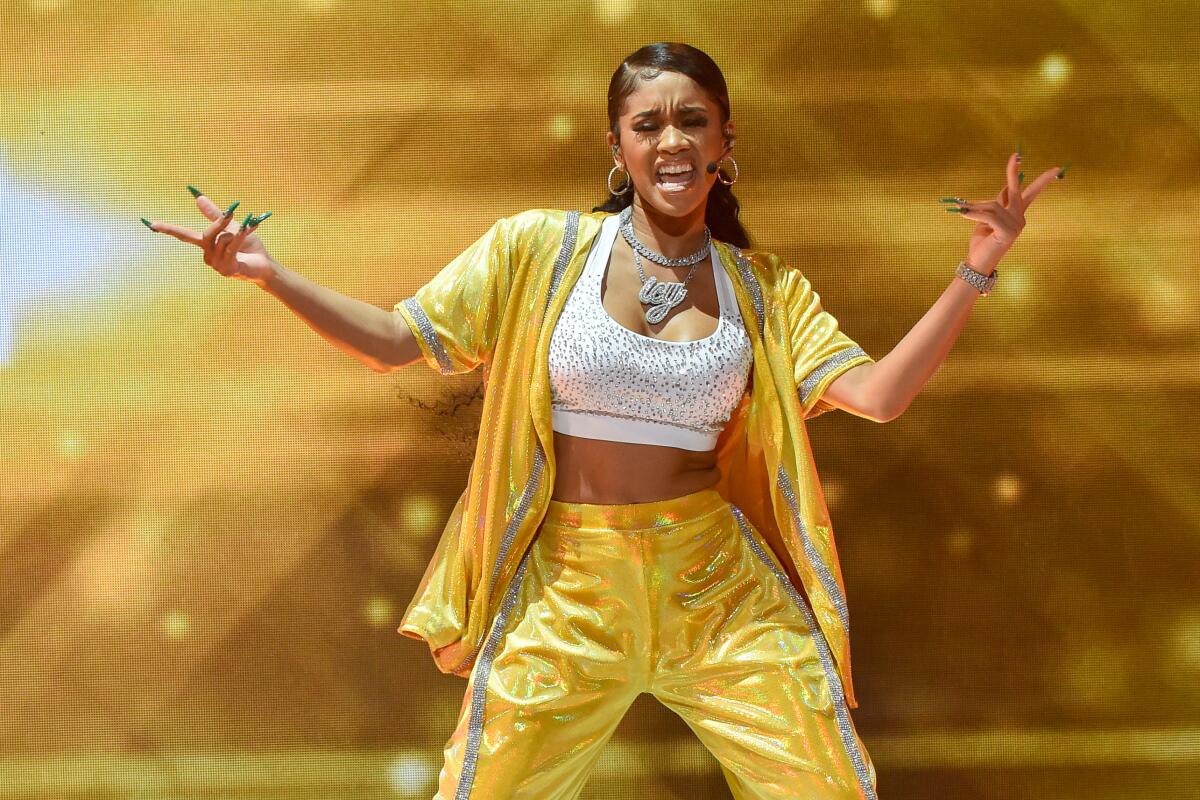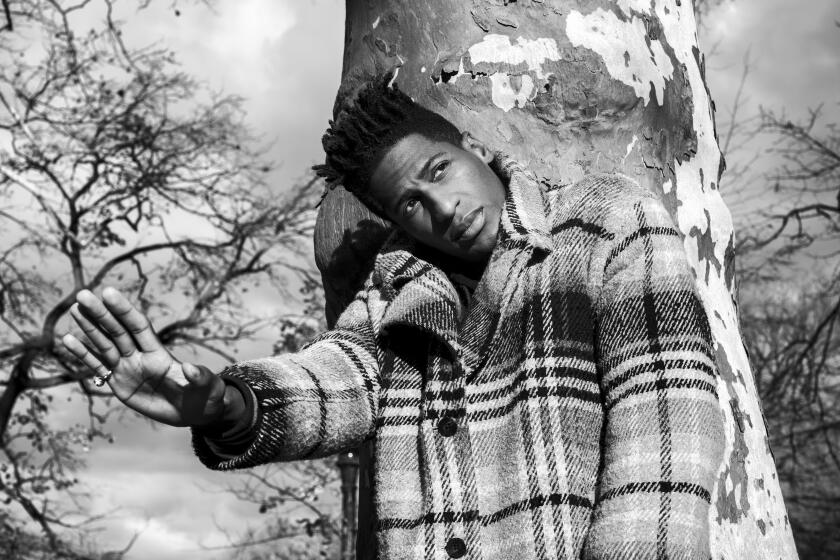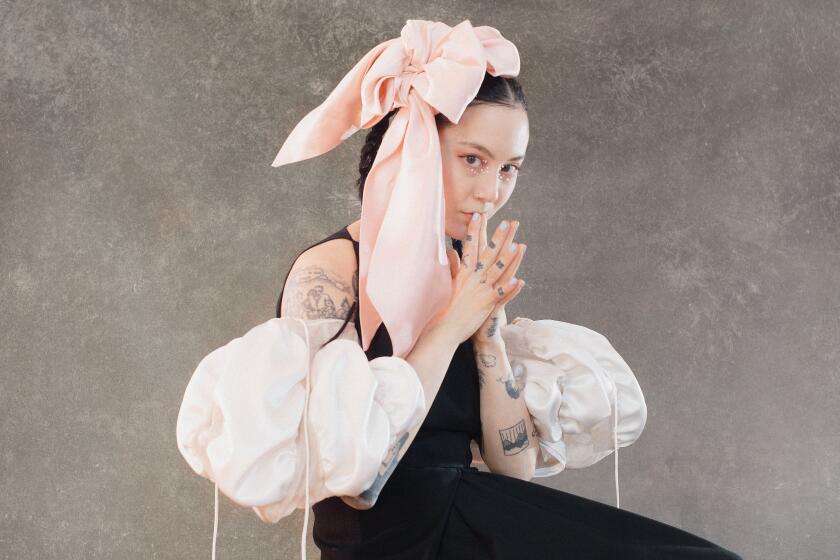For hip-hop’s Saweetie, a pair of Grammy nominations just means more reason to grind

- Share via
On the morning that Saweetie learned she was a Grammy-nominated artist, she did not cry; she did not run a victory lap; she didn’t call for a celebration at all.
Members of her team, bemused by her reaction, or lack thereof, had to cajole her into popping champagne with them.
“She doesn’t really celebrate anything,” said Eesean Bolden, senior vice president of A&R at Warner Records. “She just works harder.”
For the 28-year-old rapper — a former track star, volleyball captain and quarterback of her high school powder puff football team — recognition from the Recording Academy was less cause to day-drink and more a reminder to keep grinding.
“I’m grateful, but there’s a lot to do,” Saweetie explains via Zoom from her home in Los Angeles. “I have the mentality of an athlete. I think it’s great to make the team, but it’s important to win.”
The New Orleans native and “Late Night With Stephen Colbert” bandleader tops all Grammy nominees with 11, spread across a dizzying array of genres.
At the 64th Grammy Awards on Jan. 31, Saweetie will go head to head with nine other nominees in the race for best new artist, including pop ingenue Olivia Rodrigo, Australian MC the Kid Laroi and artist-producer Finneas, who has already won eight Grammys as songwriter and producer for his kid sister, Billie Eilish.
Saweetie’s “Best Friend,” the carefree girls-night anthem featuring Doja Cat, is also nominated in the typically male-dominated category of rap song.
“It’s time to show the world what me and my team are made of,” she says.
(Warning: Some of the videos below contain profanity.)

Despite an ongoing pandemic, Saweetie has taught a master class in maintaining momentum. In the lead-up to her long-awaited debut album, “Pretty Bitch Music,” she released a stream of jubilant, bad-bitch singles — including 2019’s “My Type,” 2020’s “Tap In” and the Jhené Aiko-assisted “Back to the Streets.” January’s “Best Friend” peaked at No. 14 on the Billboard Hot 100.
On Jan. 7 she will release a seven-song project titled “Icy Season,” followed by “Pretty Bitch Music” later in 2022. Initially scheduled for release in June, the album was held back for reasons artistic — “I had to get comfortable with singing and using melody,” she says — as well as philosophical.
“I want to deconstruct the connotative meaning of the words ‘pretty bitch,’” she muses. “You [might] think she’s arrogant, or a mean girl. But I look at her aura, her self-esteem, how she treats people. Pretty girls come in different shapes, sizes, skin tones. I love when a boy realizes like, ‘I’m pretty too.’ Pretty bitch music is about having fun and reclaiming your confidence in a world that wants to tear you down.”
Saweetie’s own confidence was hard-won. Born Diamonté Quiava Valentin Harper in Santa Clara, she grew up in a biracial family that moved frequently between the Bay Area and Sacramento. Her father, Johnny Harper, is African American, and her mother, Trinidad Valentin, Filipina and Chinese.
Saweetie developed a stutter as a child, which she combated by rapping along to her favorite songs and, in private, writing her own material. While kids called her “Stuttering Stanley,” her paternal grandmother, Roxane, called her “Sa-weetie,” with a ragtime swing.

“I got equal treatment from both my grandmothers,” says Saweetie. “They always made me feel included.”
She is one of many talented people in her family; her father played football for San Jose State, and her grandfather Willie Harper played for the San Francisco 49ers during the Joe Montana years. She knows MC Hammer as “Uncle Stan.” Actor Gabrielle Union and Grammy-winning DJ-producer Zaytoven are her cousins; the latter assisted on Saweetie’s 2019 EP, “High Maintenance.”
“There’s a lot of success in my family tree, but I’m the first to achieve substantial wealth in my immediate family,” she says. “My parents worked 9-to-5 jobs, but they never complained. They instilled [in me] a hard work ethic.”
They also raised Saweetie with a deep knowledge of hip-hop and R&B, from Tupac to Tevin Campbell. Her mother played a vixen in videos for rappers like LL Cool J and DMX; Saweetie, meanwhile, describes her as a “tiger mom” who expected straight A’s from her daughter. “She would say, ‘If you don’t do something right, you waste your time and other people’s time.’”
As she grew taller and stronger than other girls in her class, Saweetie was encouraged to channel her energy into sports. “I was always a tomboy, but I was never opposed to femininity,” she says, adding that her burlesque-inspired “Saturday Night Live” performance in November fulfilled a secret teen dream. “You know the movie ‘Chicago’? I’d watch it all the time at my grandmother’s house. I wanted to be glamorous like Velma and Roxie.”

After graduating from USC in 2016 with a bachelor’s in business and communication, she began posting freestyles filmed inside her Jeep — an economical alternative to renting a studio.
In 2017, sampling the beat from Khia’s raunchy classic, “My Neck, My Back (Lick It),” Saweetie uploaded a track to SoundCloud and named it “Icy Grl,” a nod to her first name, Diamonté, based on Spanish for “diamond.”
“You tryna get a bag of weed? I’m tryna get a bag a week / Put it in my savings and invest in the right companies,” she spit. It became an instant viral hit.

By February 2018, Saweetie signed a record deal with Warner and rereleased the song under her own imprint, Icy Records. By the fall of 2019, “Icy Grl” was certified platinum.
“She writes these hard female anthems, but she’s just being herself,” says Warner’s Bolden.
On her next hit, “My Type,” Saweetie boasted that she would never deign to date a man who earned less than eight figures.
She co-wrote the song with then-boyfriend Quavo, of hip-hop trio Migos. By March 2021, their romance had ended; a leaked surveillance video from 2020 revealed a physical altercation between the two in an elevator. (They’ve both stated that they have “moved on” — and the powder-blue Bentley Quavo gifted her has since been replaced by a Rolls-Royce.)
Already a bestselling author for her devastating memoir, “Crying in H Mart,” Japanese Breakfast’s Michelle Zauner is now also a two-time Grammy nominee.
Like a growing number of women storming the halls of hip-hop’s elite — Cardi B and Megan Thee Stallion, to name but two — Saweetie preaches a modern feminist remix of the prosperity gospel. She believes the road to women’s empowerment is paved with material and emotional security for all. But as a Black and Asian woman in the music industry, she’s still parsing what security feels like.
“I don’t think I felt it until this year,” she reflects. “I’m a confident human being, but when it comes to knowing my worth, it’s been difficult to measure. Empowerment is not being famous or having all the money in the world ... I feel like I’m constantly fighting for my value and for respect.”
For now, she’s most keen on manifesting her first performance on the Grammys stage.
“I feel like the Alchemist,” she says, referencing the Paulo Coelho novel of the same name. “I have a strong mind. If I wanted to make a sports team, if I wanted to get a 4.5 GPA, if I wanted to create my own clothing line, if I wanted to sell candy — I’m successful at whatever I put my mind to. Once I discovered my passion for music, I knew that I’d eventually get here.”
More to Read
From the Oscars to the Emmys.
Get the Envelope newsletter for exclusive awards season coverage, behind-the-scenes stories from the Envelope podcast and columnist Glenn Whipp’s must-read analysis.
You may occasionally receive promotional content from the Los Angeles Times.













